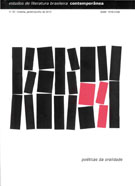A edição popular no Brasil:
o caso da literatura de cordel
Abstract
Com o intuito de estudar o cordel brasileiro sob o ponto de vista do seu sistema editorial, neste artigo buscou-se ressaltar a importância desse fenômeno editorial popular que se instituiu, no Brasil, como um marco da modernização que transformou as relações de produção cultural no Nordeste a partir dos últimos decênios do século XIX. Observada desse ângulo, a literatura de cordel é traduzida como um efeito da modernidade que se impunha em pontos estratégicos do Brasil. A popularização da imprensa no Nordeste, especialmente em Recife, onde primeiro se desenvolveu o mercado do cordel no país, tornou possível o surgimento de editores populares que, apropriando-se dos recursos tipográficos então disponibilizados, puderam, pouco a pouco, inserir-se ativamente no mercado cultural nacional.
Downloads
References
ATHAYDE, João Martins (2000). João Martins de Athayde: antologia. São Paulo, Hedra.
BOURDIEU, Pierre (1992). Les règles de l’art: gènese et structure du champ littéraire. Paris, Seil.
BRITO BROCA, José (1975). A vida literária no Brasil: 1900. Rio de Janeiro: José Olympio.
_______ (1994). O repórter impenitente. Campinas: Ed. Unicamp.
SOUZA, liedo Maranhão de (1981). O folheto popular: sua capa e seus ilustradores. Recife: Massangana.
Downloads
Published
How to Cite
Issue
Section
License
Authors who publish in this journal agree to the following terms:
a) The authors maintain the copyright and grant the journal the right of first publication, the work being simultaneously licensed under the Creative Commons Attribution License-Non Commercial 4.0 which allows the sharing of the work with acknowledgment of the authorship of the work and publication this journal.
b) Authors are authorized to enter into additional contracts separately, for non-exclusive distribution of the version of the work published in this journal (eg publish in institutional repository or as a book chapter), with authorship recognition and publication in this journal.
c) Authors are allowed and encouraged to publish and distribute their work online (eg in institutional repositories or on their personal page) after the editorial process, as this can generate productive changes, as well as increase the impact and citation of published work (See The Effect of Free Access).
d) The authors of the approved works authorize the magazine to, after publication, transfer its content for reproduction in content crawlers, virtual libraries and the like.
e) The authors assume that the texts submitted to the publication are of their original creation, being fully responsible for their content in the event of possible opposition by third parties.


